Archive for January 23rd, 2014

SAGCs in even worse state
 (CNS): Statutory authorities and government companies (SAGCs) cost the Cayman taxpayer over $100 million every year but the auditor general has found a complete lack of accountability in most of them, which appear to be failing on the good governance front even more than core government. Pointing to poor standards of governance amongst the semi-autonomous public bodies, with none of them properly accounting for what they do, Alastair Swarbrick said the SAGCs are failing to tell the story of how they spend public money or how they are achieving government aims and objectives.
(CNS): Statutory authorities and government companies (SAGCs) cost the Cayman taxpayer over $100 million every year but the auditor general has found a complete lack of accountability in most of them, which appear to be failing on the good governance front even more than core government. Pointing to poor standards of governance amongst the semi-autonomous public bodies, with none of them properly accounting for what they do, Alastair Swarbrick said the SAGCs are failing to tell the story of how they spend public money or how they are achieving government aims and objectives.
Employing 38% of public sector workers, the 26 entities account for around $300 million of expenditure and bring in around $200 million of revenue. They also deliver a significant number of government services, from health to connecting the islands.
As part of a recent assessment and audit of good governance in central government, the Office of the Auditor General (OAG) also looked separately at the issues relating to statutory authorities and government companies. The team undertook a survey, which was sent to 25 public authorities, consisting of 36 questions relating to principles of good governance. While 17 of the authorities responded to the public auditor, eight made no attempt to fill in the survey to assist the office.
Cayman Airways, which receives a considerable subsidy from government every year, the Cayman Islands Development Bank, the Children Youth And Services Foundation, The Civil Aviation Authority, The National Drug Council, The National Housing Development Trust, as well as the Sister Islands Affordable Housing Initiative and the University College Of The Cayman Islands failed to answer the auditor’s questions.
From those that responded, the auditor general found a variety of practices across the entities relating to how they are governed which gave him serious cause for concern.
“Many of the practices we found were not acceptable. The good governance of these organisations are in some cases are contrary to such laws as the anti-corruption legislation in place,” Swarbrick said.
While his office was already well aware of the problems as a result of the financial audits it has undertaken, this report reinforced that understanding of what he said were “poor practices and the extent of effort required for improvements to be implemented".
Swarbrick also raised concerns about the lack of response from the eight, despite considerable follow-up action by his office.
“This in itself indicates to me a considerable issue with regard to entities supporting the concepts of good governance and doing what they need to ensure they have good practices employed in their entities,” the auditor general said in his conclusion.
He warned that his office would be returning for further audits in specific organisations to “determine the extent to which the poor governance practices have led to poor performance and lack of due diligence with respect to the management of public resources.”
In his substantial report Swarbrick said the framework in the Public Management and Finance Law (PMFL) for SAGCs to report to government was not working, so there was no accountability and few assurances that the public authorities were working effectively or achieving any of government’s objectives.
He said that in many cases results were not clearly stated and, as with the problem in core government, these entities are focused on activities, not goals or how they are achieving value for the money they get from the public purse. Pointing to confusion over roles as well as their continued failure to produce timely or accurate financial accounts, how they achieve value for money is completely absent in most cases.
All organisations that spend public money have to strive for economy efficiency and effectiveness in their work, Swarbrick noted but said, “We did not observe one situation where an SAGC established how it had achieved value for money in its operations.”
The auditor general found a policy void from core government with regards to direction, which he said had led to uncertainty, and while these entities are meant to have some autonomy, government appears to have lost control of them.
In his response to the problems surroundingSAGCs Premier Alden McLaughlin said that they had been difficult for government to rein in. He spoke about the pay freeze implemented across the civil service which was largely ignored by the SAGCs and said that some of the CEOs were earning far more than the governor, the deputy governor or himself. He indicated that in some cases where the creation of a government company or authority has failed to do what It was originally created to do, government would be considering taking back the services into core government.
Even though CEOs are getting top dollar in these companies, Swarbrick’s report highlighted many failures as well as confusion of roles between the ministries and their staff’s responsibilities with the boards and CEOs of the SAGCs.
“There is an incomplete understanding about how good governance framework is supposed to work in the SAGCs,” he said
While chief officers are supposed to be responsible for monitoring the relevant SAGCs in their ministries, because government isn’t setting clear directives or policy goals for them there are no clear results expectations.
Ironically, the audit office found that the Cayman Turtle Farm, which gets the largest subsidy from government and is one of its most troublesome authorities, was the only government company to identify what it was really for and had performance targets.
Outlining his concerns, Swarbrick said that good governance provides a roadmap for how a country is governed, including its economic policies and regulatory framework, as well as adherence to the rule of law.
“In my reports, I talk about how the lack of good governance can lead to corruption and the abuse of public authority or trust, for private benefit. As we all know, corruption undermines the public’s trust in its government. It also threatens market integrity, distorts competition, and endangers economic development,” Swarbrick warned.
With myriad problems at the SAGCs, the auditor noted it was government that had to address the significant gaps between what is expected and the current reality.
“With 26 entities reporting to core government and a sizable part of how government delivers services to residents, SAGCs need to be accountable for their results. We found that Government has yet to implement an effective means to hold these entities to account,” he said.
“We identified many practices which were weak and did not reflect reasonable governance practices for these types of entities, leading to increased risks,” Swarbrick added and emphasised that SAGCs are simply not achieving the results and outcomes that should be expected of them.
Check back to CNS for more on the missing ethics, values and conflicts of interest in government found by the OAG.
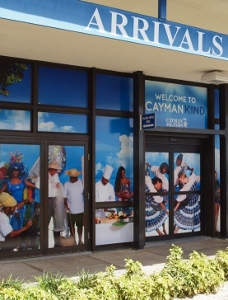
12 get jobs in tourism drive
 (CNS): The push to get local people placed in tourism sector jobs seems to have encountered a few hurdles. According to a release from the Cayman Islands Tourism Association (CITA), although officials avoided being direct about the details, CITA indicated that they faced various challenges during the Tourism Employment Drive (TED), which took place in October and November. Just twelve people have secured work as a result of the efforts, which is far short of the 200 positions that were targeted at the beginning of the initiative. CITA said that it would nevertheless be continuing with the drive this year, having learned some undisclosed lessons during the first attempt.
(CNS): The push to get local people placed in tourism sector jobs seems to have encountered a few hurdles. According to a release from the Cayman Islands Tourism Association (CITA), although officials avoided being direct about the details, CITA indicated that they faced various challenges during the Tourism Employment Drive (TED), which took place in October and November. Just twelve people have secured work as a result of the efforts, which is far short of the 200 positions that were targeted at the beginning of the initiative. CITA said that it would nevertheless be continuing with the drive this year, having learned some undisclosed lessons during the first attempt.
CITA said more than 120 individuals met with industry professionals and received training packages. A third of those, or around 40 individuals, went on to interview at tourism businesses, and around 10% of the original group of 120 were placed in jobs and are now working, it added. Officials from the association also stated that interview referrals and follow-ups to both prospective employers and employees are ongoing, and as a result more candidates are expected to be starting jobs before the end of this month.
The public private partnership campaign consisted of a five-district road show through Grand Cayman at which attendees registered with the National Workforce Development Agency received referrals for job interviews and skills training.
“The TED programme has helped us address practical challenges of connecting job seekers to the opportunities in the tourism industry,” said Lois Kellyman, Manager for Employment Services at NWDA, which partnered with CITA on the drive. “We look forward to working with Cayman Islands Tourism Association on more employment drives and calling on the tourism association as a resource in our ongoing job placement initiatives.”
However, according to the CITA President Ken Hydes, the initiative, in which he said people from the industry spent many hours, appears to have presented some difficulties.
“Decision makers in the tourism industry dedicated hundreds of hours to the TED programme, literally going district to district to meet with people,” Hydes said. “As with any new programme, this one had a few challenges. We are refining the processes and are encouraged by our results so far. With strong support from government and a commitment to an annual drive and ongoing follow ups, the tourism industry has a systematic plan to draw more Caymanians into our business.”
Officials said that leaders from the tourism industry have since met with government “to discuss the lessons learnt from the Tourism Employment Drive (TED)”.
Organizers said that it had been quickly realized that there were “opportunities to facilitate training”, as it seemed candidates were not necessarily prepared for the jobs available. However, both CITA and government officials have avoided addressing what lessons were learned and what the challenges were.
There was no indication if the very low number of placements was down to the lack of skills in candidates or other issues, if the sector did not have as many openings as anticipated, or if the candidates were not happy with the pay and conditions on offer.
Although there were only twelve placements, falling far short of the goal of getting 200 local workers into tourism, Employment Minister Tara Rivers was supportive of the initiative.
“This long-term partnership has real potential to create change and to ensure that Caymanians have opportunities to be active participants in the growing tourism labour market,” she said. “In addition to providing employment opportunities the focus of the partnership is on human capital training and development which is critical for successful employment and career advancement in the industry.”
The TED initiative was led by business owners and senior leaders in the tourism industry, notably Janette Goodman of The Ritz-Carlton, Grand Cayman, Steven Hayes of Tropical Trader Restaurant Group and Markus Mueri of NM Ventures. Both Stepping Stones and CITA staff supported the ongoing data collection and follow-ups to help facilitate interview referrals.
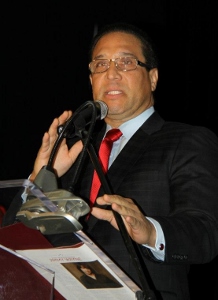
Press briefings ‘pot shots’ at government, says Alden
 (CNS): The regular TV press briefings originally instigated by the former PPM administration, adopted and dropped by the McKeeva Bush led UDP government and then reinstated by the minority Cabinet last year will not be returning. Once a staunch advocate of the briefings, Premier Alden McLaughlin said his government would answer any press enquiries when they were made but he did not see a need to re-establish weekly briefings just so the media could take "pot shots at government". Although the PPM had said it would hold regular briefings, if not necessarily on a weekly basis, since coming to office the ministers have held only specific calls, where the media have been directed to ask only relevant questions to the press briefing topic.
(CNS): The regular TV press briefings originally instigated by the former PPM administration, adopted and dropped by the McKeeva Bush led UDP government and then reinstated by the minority Cabinet last year will not be returning. Once a staunch advocate of the briefings, Premier Alden McLaughlin said his government would answer any press enquiries when they were made but he did not see a need to re-establish weekly briefings just so the media could take "pot shots at government". Although the PPM had said it would hold regular briefings, if not necessarily on a weekly basis, since coming to office the ministers have held only specific calls, where the media have been directed to ask only relevant questions to the press briefing topic.
On Wednesday, however, when the premier appeared alongside the deputy governor to talk about and answer questions regarding the auditor general’s latest reports on the shortcomings of governance, CNS asked the premier if press briefings would be returning and for answers to a number of unanswered questions that have been submitted over the last few months.
McLaughlin dismissed the need for regular briefings.
“If the media has questions, let us have them. I am not prepared to engage in a back and forth and let the media take pot shots at us,” he said.
When pressed, he gave short answers to some of the questions that CNS has submitted, including details on the government’s plans for one man, one vote and the state of the Dart talks, but the premier made it clear that there was little he could say on the subjects, which was why the questions had not been answered.
During the election campaign the PPM had highlighted their introduction of weekly briefings as a positive factor in their preference for open and transparent government. They were held, the party said, to advise the media and country of government actions and activities.
“One of the first changes the PPM government introduced was a weekly press briefing at which journalists could ask what they wanted,” the party manifesto from the 2013 campaign states.
Although the current premier has not resorted to televised national statements since taking office, an issue he criticised the former premier over, he has utilized his press secretary to send out statements to the media on issues such as the immigration changes and other key policy decisions. In such cases, the media then has to chase the premier, other relevant ministers or senior civil servants regarding any questions arising.
Disappointed about the position taken over communicating with the media, CNS reporter, Wendy Ledger, said, "Everyone in the local press appreciates that government ministersare busy and feeding the ever-hungry news beast is not a priority for them.
“But getting questions answered in a timely fashion is never easy so we end up calling and pestering busy politicians for answers,” she said, adding that while some government ministers and officials are very quick and helpful answering enquiries, on some of the more sticky issues government has been less forthcoming.
“It may not be their priority to answer us but it’s our job to press,” said Ledger. “With a regular briefing we can ask all the questions and raise all the topical queries at one time when we know we will be meeting with government ministers. This is an advantage for them, too, as it means they won’t be fielding calls and emails all the time when they are busy.
“It avoids us all constantly, as individual reporters, often asking very similar questions and the same ministers then having to repeat the answers. It would also prevent us from having to resort to the tired lines saying we have contacted the relevant minister or official but don’t have a response when we run reports on issues of public interest and concern,” she added.
Ben Meade, the news director Cayman 27, also had some concerns. He said that the team’s reporters have not had a problem with access to the premier and some of his cabinet ministers but he was hoping that McLaughlin would reconsider his position.
“I trust that this will continue despite his recent position on the press briefings. However, I find it unfortunate that the premier sees it fit to view press briefings as an opportunity for members of the press to 'take pot shots' at him. Part of our role in the media is to hold public officials, elected and otherwise, accountable on behalf of the Cayman public. Regular press briefings provide a great avenue for this and I hope he seriously reconsiders his position on this matter," he told CNS.
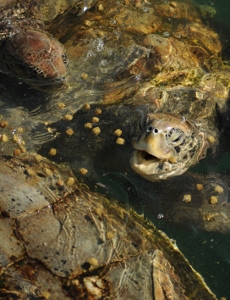
UK to fund turtle survey
 (CNS): Experts from the Department of Environment (DoE) have received funding from the UK’s Darwin Project to conduct research on how much turtle meat is being consumed locally and to look at the impact of the Cayman Turtle Farm’s release programme on the wild population. The DoE will look at how many of the wild turtles nesting here were originally from the farm and other data. Following meetings with the World Society for the Protection of Animals (WSPA) and government this month, officials said talks had been positive, with the charity accepting the cultural significance of turtle to Cayman while government accepted the need to stop promoting meat to visitors and rethink releasing farmed turtles into the wild.
(CNS): Experts from the Department of Environment (DoE) have received funding from the UK’s Darwin Project to conduct research on how much turtle meat is being consumed locally and to look at the impact of the Cayman Turtle Farm’s release programme on the wild population. The DoE will look at how many of the wild turtles nesting here were originally from the farm and other data. Following meetings with the World Society for the Protection of Animals (WSPA) and government this month, officials said talks had been positive, with the charity accepting the cultural significance of turtle to Cayman while government accepted the need to stop promoting meat to visitors and rethink releasing farmed turtles into the wild.
“These concerns will be investigated further through research conducted by the Department of Environment and their project partners via Darwin Plus funding made available by the UK Government,” the Cayman government said in a joint release with the WSPA, which has spent the last two years campaigning to transition the Cayman Turtle Farm (CTF) into a real conservation research centre.
Following a more cordial meeting with the new administration and WSPA than in the past, the government agreed to address all the appropriate concerns that have been raised by the charity about the conditions at the farm as well as to undertake the research.
“This long-term study will also look into the effectiveness of the turtle-release programme and potential contribution of releases to wild populations of turtles,” it said. The WSPA said it was pleased to learn that the future release of farm-raised turtles has been suspended until the findings of the research are available.
The announcement of the research and the funding follows concerns raised by a report from the UK parliament’s Environmental Audit Committee on Sustainability in the UK Overseas Territories, which specifically pointed to issues at the Cayman Turtle Farm. The committee visited the public section as well as its behind-the-scenes turtle breeding operations and found discrepancies surrounding the farm’s claims in relation to demand in Cayman for turtle meat.
“There remains some dispute whether the Cayman Turtle Farm is creating an artificial market in the tourist industry by encouraging visitors to eat a meat that the majority of indigenous people now shun,” the report noted. The farm has argued that wild turtles would be poached were it not for the farmed turtles it raises but the 25% price reduction last year raises questions about the real level of demand.
The committee also found that the cost of the government-owned company and the almost $10 million annual subsidy from the public purse, an amount four times greater than the annual budget of the Department of Environment and 20 times greater than funding for the Cayman Islands National Trust, was of significant concern to the environmental committee. The committee also drew attention in the report to the August 2012 incident when over 300 green turtles at the CTF were killed after a leak from a seawater pipe left them to dry out without water in a holding container.
Committee members also witnessed several large wild turtles trying to swim from the sea up the sewage outflow channel from the farm when they visited.
“It is conceivable that those were female turtles which had been released from the farm and which were following their natural instinct to return to where they were hatched to lay their eggs,” they observed in the report and welcomed WSPA’s proposal to transition the farm to a wildlife rehabilitation and rescue facility.
“We are pleased that the UK Environment Audit Committee has brought further attention to the extensive ongoing problems at the Cayman Turtle Farm, including its significant drain on the public purse, considerable animal welfare problems, and creation of an international market for turtle meat, which is stoking demand that would not otherwise exist for an endangered species,” said Dr Neil D’ Cruze, WSPA Head of Wildlife Policy and Research, when he arrived in Cayman recently.
However, following the constructive talks with the DoE and other government officials, he said the charity was delighted that funding had been secured to investigate the true level of demand for turtle meat and the impact of releasing farmed turtles.
“It is clear that the information generated by this study will greatly inform effective decision making regarding the long-term future of the farm, including the possibility of its transition into a rehabilitation and release facility,” Dr D’Cruze added. “We also applaud the Cayman Islands Government for working with us in such a positive manner to identify critical short-term steps that can be taken to help alleviate the immediate animal welfare concerns at the farm.”
The charity is particularly pleased that there will be no more turtle releases from the farm until the conclusions of this study are made available and that various stakeholders will explore how to limit the promotion of sea turtle meat to visiting international tourists.
The facility is the last remaining sea turtle farm in the world, with over 9,500 endangered green sea turtles currently held there, having been bred to meet what is now a questionable demand. The WSPA said it believes the farm has lost its original sense of purpose and is now seriously undermining the health and welfare of sea turtles farmed on its premises.

President’s Cup semifinals set
(CIFA): George Town SC and Bodden Town FC aim to recapture the goal scoring form in the President’s Cup Semifinals, after finding out their opponents on Wednesday. George Town drew Elite Sports Club and ever improving Sunset meets Bodden Town. Both first leg matches will take place at the Annex on Sunday 9 February, 2014. At the semifinal draw George Town Captain Ian Lindo expressed his desire to return to action with the same form his side ended 2013. In the opening round a double strike from Miguel Simms helped Lee Ramoon’s men kick Scholars International out of the competition.
Lindo said, “When we return to action we have to get back the focus we had before the break. At George Town we are a fun club and we have mixed that with a much more focused mentality. This combination has led to more success on the pitch which we hope to recapture against Elite.”
Elite Sports Club’s Dwayne Wright expects a stern challenge from the George Town unit.
“We are comfortable with the draw against George Town. Every team brings a challenge but we are ready,” said Wright, the reigning Most Valuable Player of local football.
In the evening’s opening fixture Bodden Town lines up against Sunset FC. Elbert Mclean’s Bodden Town side was propelled by double strikes from Theron Wood and Ricoh Brown in a 6-0 drubbing of Academy Sports Club.
Manager Kennedy Kelly said good preparation is key to his team’s chances of winning.
“We have to prepare the best we can. Sunset is a good team holding their own in the Premier Division and the first time we met this season they held us to a draw. We intend to let our playing do the talking.”
Sunset FC Defender John Bruton and General Secretary Kevin Poole represented the club at the draw.
Bruton said, “Bodden Town is a strong opponent and we expect a difficult game. One our day we can match any team and progress to the final. Before the season’s break we were on a bit of a run which we hope to continue. It starts with the belief that we can do it.”
“Sunset has done well since our promotion to the Premier League. We look forward to the challenge of facing Bodden Town,” Poole said.
For more on local footbal visit www.caymanfootball.com
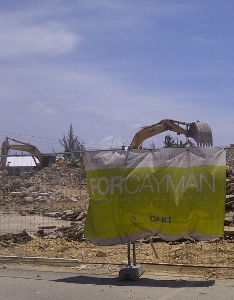
No progress in Dart talks, says premier
 (CNS): The talks between the PPM administration and Dart Realty have made no progress, the premier has confirmed. After months of silence on the subject, Alden McLaughlin stated Wednesday morning that the talks between his government, which began shortly after the election last year, are ongoing but they were not making any progress, which was why ministers had remained silent. The talks are focused on efforts by the CIG to renegotiate the deal between it, the NRA and Dart signed by then premier McKeeva Bush in December 2011. The PPM government is on record as describing some elements of the deal as unacceptable and wide concerns remain that it is heavily in Dart’s favour and does not represent value for money for the public purse.
(CNS): The talks between the PPM administration and Dart Realty have made no progress, the premier has confirmed. After months of silence on the subject, Alden McLaughlin stated Wednesday morning that the talks between his government, which began shortly after the election last year, are ongoing but they were not making any progress, which was why ministers had remained silent. The talks are focused on efforts by the CIG to renegotiate the deal between it, the NRA and Dart signed by then premier McKeeva Bush in December 2011. The PPM government is on record as describing some elements of the deal as unacceptable and wide concerns remain that it is heavily in Dart’s favour and does not represent value for money for the public purse.
The discussions are understood to include talks about the remaining stretch of the West Bay Road as well as the issue of the hotel accommodation tax rebate, which appears to be one of the major stumbling blocks in the talks.
The PPM did state on the campaign trail that it would be seeking to renegotiate what is now commonly known as the NRA deal. It was hoping to have some form of through access in the area of the West Bay Road, which is now completely blocked since the previous interim administration and former UDP members gazetted the closure. However, the Progressive administration admitted shortly after being elected that the closure appeared to be irreversible. While the remaining stretch is still in its hands, no one from government has said whether or not that remaining strip of road can be saved because, despite the existing deal, the government will still need to gazette any closure and so retains a strong negotiating tool.
At a PPM public meeting shortly after the election, Works Minister Kurt Tibbetts, who now has responsibility for the NRA, made it clear that the 50% accommodation tax concession given to the developer in the deal, which spans a thirty year period on any hotel or tourist accommodation Dart buys, builds or otherwise acquires was not acceptable.
The concession will see Dart keeping half of the taxes charged on all accommodation for ten years after the opening date, not just on the proposed $200 million hotel and condo resort on the West Bay Road but any other tourist accommodation it owns in the future, which could have a serious impact on the public purse if the developer was to acquire any existing accommodation. It also undermines potential earnings for government in future, given the potential buying power of Dart as the island’s largest land owner and investor.
Tibbetts has also previously stated that such a generous concession was presenting problems to government as it entered into talks with other developers, who all now ask for the same concession before discussing any potential tourism investments.
It is not clear if the lack of progress in the talks will have an impact on Dart’s plans for the proposed hotel on the site of the former Courtyard Marriott, which the developer says is due to open as a Kimpton Hotel in 2016.
As the talks stall, four ladies from West Bay are also still waiting on a Grand Court decision from Justice Alex Henderson regarding the legal action they took against the government over the way that the West Bay Road was disposed of under the NRA agreement.
A judicial review application regarding the same issue was denied last year as a result of timeline technicalities before the substantive argument over the legality or otherwise of the roads closure was ever considered.
Alice Mae Coe, Betty Ebanks Annie Multon and Ezmie Smith managed to take the issue further and although both government and Dart’s lawyers had argued that the law suit was the wrong way to deal with the complaint, they were able to present their full case before the judge at the end of last year.
The hearing took place between 9 and 13 December but no date for the ruling has yet been confirmed.
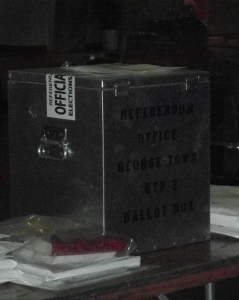
OMOV not a priority for CIG
 (CNS): The Cayman Islands premier has stated that the implementation of one man, one vote and single member constituencies is not a current priority, which is why it has not featured in government’s legislative agenda for this year. Even though all of the government members, including those elected on the Coalition for Cayman ticket, campaigned on changing the local voting system, it will not be happening anytime soon. Alden McLaughlin said Wednesday that government has other priorities and no timeline has been established for when it will be bringing the necessary legislation to parliament. The premier said the top priorities were getting people back to work, the local economy and stabilizing the country.
(CNS): The Cayman Islands premier has stated that the implementation of one man, one vote and single member constituencies is not a current priority, which is why it has not featured in government’s legislative agenda for this year. Even though all of the government members, including those elected on the Coalition for Cayman ticket, campaigned on changing the local voting system, it will not be happening anytime soon. Alden McLaughlin said Wednesday that government has other priorities and no timeline has been established for when it will be bringing the necessary legislation to parliament. The premier said the top priorities were getting people back to work, the local economy and stabilizing the country.
The premier has been repeatedly accused of not fully supporting the concept of single member constituencies, although many of his party members and C4C government colleagues have all been staunch advocates. However, McLaughlin has denied any lack of support for the voting system and has repeatedly stated he supports both one man, one vote and single member constituencies.
Nevertheless, the premier made it clear that his government would not be dealing with it in the near future and there was no timeframe for when the legislation would come before the Legislative Assembly.
The premier will have to discuss the issue in the LA shortly, however, as Arden Mclean, the independent member for East end has filed a private members motion in the Legisaltive Assembly seconded by Ezzard Miller asking the government to make the necessary and relatively small amendments to the elections law within the nexxt three months. This would enable the Elections Office to begin its work in making the new constituencies a reality and embarking on the education campaign for voters.
Miller told CNS recently that if government does not make the amendments to the election law before the end of this financial year he was prepared to go to the expense, if necessary, of having the legislation drawn up and presenting a private members bill to the House.